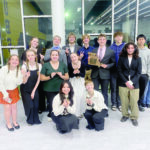Last week, the Barry County Museum received a phone call from a researcher in New Hampshire investigating the life of the late poet Frank Stanford.
A graduate of the University of Arkansas, Stanford took his own life in 1978 at the age of 29 by shooting himself in the chest three times with a .22 revolver after an argument with his wife over his girlfriend. The poetry of Frank Stanford has received renewed interest in the past few years, leading to the inquiry from New Hampshire about a publishing company out of Seligman owned by the Delamer Duverus family that had printed some of the poet’s works in the 1970s.
While I didn’t recall the name Delamer Duverus, I did remember scanning a stack of Seligman Sunbeam newspapers that Murray Bishoff had brought into the museum a couple years ago, and now that I’ve come across the name Delamer Duverus, I probably won’t be able to forget it.
Delamer Duverus and family printed the revived Seligman Sunbeam in 1972, taking the name from the original 1881 Seligman newspaper. The inspiration for restarting the paper came from a disagreement over purposed city zoning ordinances that were required for accepting federal funds for sewer and water system upgrades.
A year later, the name was changed to the Ozark Sunbeam, and then the American Sunbeam, moving publication to Springdale, Ark., in 1982.
Originally from New York (like that other interesting person Jean Wallace, also known as the Mountain Maid of Roaring River) Delamer Duverus’ birth name was Edward Roberts, but he went by Bob. The Delamer Duverus family was a semi-religious non-denominational commune of about 50 adult members that held property in Seligman as well as Northwest Arkansas, with Delamer Duverus elected coordinator.
Family members worked at the print shop, newspaper, vegetable garden, gift shop, and bookstore. According to a 1974 interview given by Delamer Duverus in a Kansas City newspaper, the family operated under the philosophy of teleology, or the study of patterns in time, as laid out in their self-printed book “The Golden Reed.”
Delamer Duverus also stated that he didn’t want people to be stigmatized by the word commune, as “All of these people are very moral. They’re married, they have their children. We don’t go in for drugs or alcohol ourselves and we don’t want anybody here who does.”
These efforts of community building brought to mind another interesting Ozark individual, free silver advocate Coin Harvey, who built the town Monte Ne on the White River near Rogers during the early 1900s, now mostly covered by Beaver Lake.
In 1932, Harvey unsuccessfully ran for President with the Liberty Party he formed. Coin Harvey’s second wife Mae Ellston Harvey was buried at Maplewood Cemetery in Exeter in 1948. In 1973 the Ozark Sunbeam printed a series of articles on the life of William Hope Harvey, so maybe the Delamer Duverus family found inspiration in Coin Harvey.
By the late 1970s, the American Sunbeam was being characterized as radical newspaper. In a 1978 article appearing in a St. Louis newspaper, the writer paraphrased a Duverus conversation as “The Illuminati are an international conspiracy of bankers plotting to take over the world, homosexualism is a disease that invades the lymph system and makes men smell funny and Henry Kissinger has been excommunicated from the Jewish religion.”
Similarly, an article from 1980 in the Springfield paper stated, “Anyone who has read the Sunbeam knows how Duverus wants to change the county. Jimmy Carter, homosexuals, one world government, fluoridation, zero population growth, weather modification, the Equal Rights Amendment, communism, Mike Wallace and John Connally are only a few of the people and issues that have be recent targets of Sunbeam articles.”
Given this list of grievances, it’s not hard to see how Delamar Duverus quotes are popular in conspiracy corners of the internet, particularly “One basic truth can be used as a foundation for a mountain of lies.”
The Sunbeam wouldn’t be the first Ozark newspaper to rail against foreign influence. In the 1910s, the anti-Catholic newspaper The Menace printed in Aurora warned of Vatican manipulation in American politics.
It’s kind of ironic that Delamer Duverus would espouse views considered to be antisemitic from a town named after Jewish banker, Joseph Seligman, who had large investments in the railroad that created the town of Seligman in 1881.
One view of Delamar Duverus that most people probably could get on board with was, “There’s nothing wrong with the system, it’s the people in it.”
Perhaps the system would work better if we elected a few more boring individuals and a few less interesting folks.
Jeremiah Buntin is a historian at the Barry County Museum. He may be reached at jbuntin@barrycomuseum.org.






